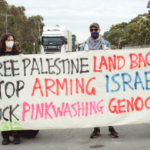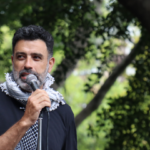Fining the Homeless for Begging

Here’s a shocking reality: in most States and Territories across Australia, it’s illegal to beg for money. Yes, you read that right – asking for help can lead to criminal penalties.
Imagine being homeless, with nowhere to sleep and no way to afford your next meal, only to be slapped with an on-the-spot fine of $250 in South Australia simply for trying to survive. In Melbourne, it’s even worse – advocacy services report that homeless individuals have accumulated fines as high as $50,000 for begging.
“Begging is broadly illegal for a number of reasons. Vagrancy, as it used to be called, was punishable, but in reality what it meant was that people who were poor could be taken off the streets and effectively be fed,” Bill Potts, the President of Queensland Law Society, said when interviewed on The Project.
“What’s the point of [the fines], it merely adds to their misery – and effectively ends up in a cycle of poverty, and unfortunately incarceration,” continued Potts.
Budget Cuts to Homeless Services See Numbers Skyrocket
The Federal Government plans to cut $65.5 million in funding from homelessness services from 1 July 2023. This is equivalent to around 650 homelessness workers across the country and will result in more people, including women and children fleeing family violence, being unable to access the help they need to avoid or escape homelessness.
Since the funding reductions, the number of people sleeping rough has skyrocketed.
In New South Wales, an average of 46 individuals and families are turned away from homelessness services every day.
Australia wide, roughly 300 people a day are turned away because funding has been slashed and services are overstretched.
This is not the only time a slash in funding has impacted homelessness
In 2016, a clinic in Darlinghurst that helps 1,200 homeless people each year announced that it will be forced to close in April if it can’t find funding. The Haymarket Clinic lost $900,000 in annual funding in the Federal Government’s 2014-15 Mid-Year Economic and Fiscal Outlook and has been unable to raise replacement funding.
According to the latest Street Count figures, it was found that roughly 2037 people are sleeping on the street, compared to the 1623 people last year. This has increased by 1% in City Sydney and approximately 16% in Byron Bay.
The cuts to funding alongside the rising interest rates, cost of living pressures and a shortage of rental homes are facts which are contributing to the homelessness and street sleeping crisis.
Being Homeless in New South Wales
Thankfully, New South Wales, alongside Western Australia and the ACT, is one of the few states that doesn’t actively fine people for being homeless. However, there are still a large number of laws and regulations that disproportionately punish the State’s homeless.
The recent expansion of Alcohol Free Zones in the City of Sydney, and elsewhere across the State, has been criticised for targeting low-income groups.
With the average price of a beer in a city bar about $8 a schooner, people need somewhere else to have fun and unwind. Taking away their alcohol in a park significantly reduces the amenity of that park for them.
Some believe alcohol free zones have the ulterior motive of giving police and Council rangers the power to target anyone they don’t like the look of, and getting ‘undesirables’ out of the area by prohibiting the use of alcohol and, in the case of police, using ‘move on’ powers.
There are also growing reports that private security guards hired by the Council have been involved in a campaign of intimidation against the residents of Belmore park’s tent city.
In July last year, 55 tents inhabited by homeless people covered Belmore Park, the City of Sydney Council confirmed. Today there are fewer than a dozen.
“Hundreds of people have been moved on to some other place, God knows where. They’ve just vanished,” Reverend Bill Crews from the Exodus Foundation said.
Belmore Park resident Jacob Sie, who has lived under a sheet of plastic in the park for the last five months, recently told the ABC that the Council had been clearing out the Park’s residents.
“If no one has been in their tent for like say two or three days then they put a notice on the tent,” Mr Sie said.
“Council just comes with a big truck and that and the tents get all ripped down.”
Other measures such as: the introduction of motion lighting in the undercover areas near the State Library; metal spikes on sitting areas near Central station; and alterations to CBD train stations that lock off bathrooms to those without a ticket; go to show the lengths being taken to remove basic amenities for the city’s homeless population.
To their credit, Councillors of the City of Sydney have shown genuine concern for helping assist the city’s growing homeless population, providing funding for services and working through Sydney’s Homelessness Unit.
However, without a broader consensus on how to best tackle the issue, and increased funding for services around the country, their efforts are just a drop in a very large ocean.






